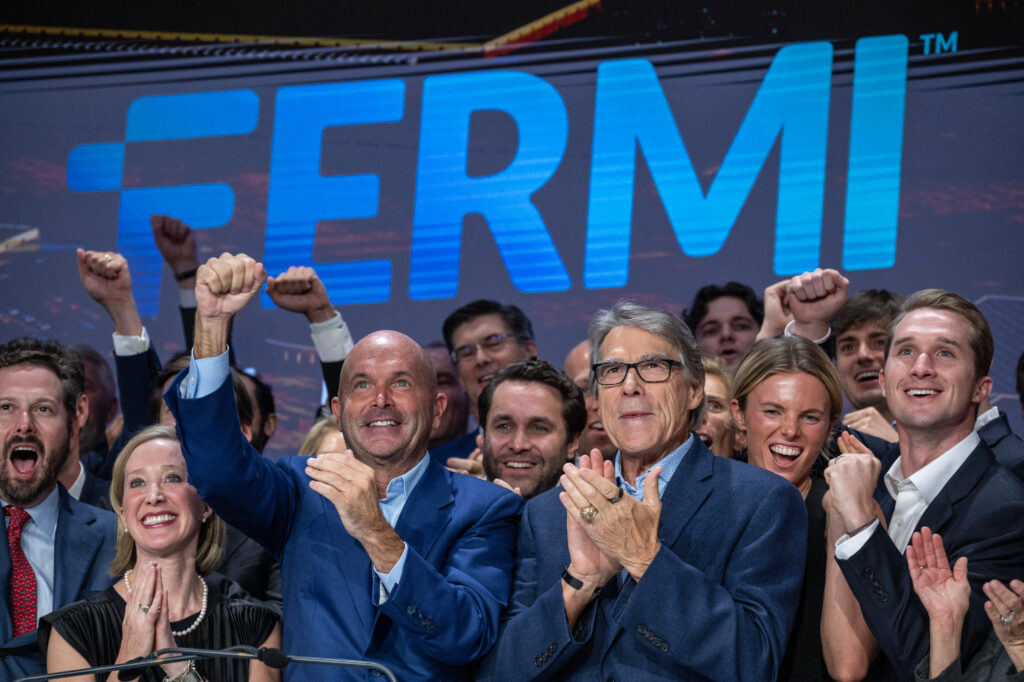The fledgling Texas company Fermi America has yet to produce an electron, split an atom or survive the torturous gantlet of regulatory and manufacturing obstacles required to build a nuclear reactor.
But investors are betting big that the Trump administration will help Fermi turn from a glossy, aspirational marketing brochure into a cutting-edge nuclear operation to meet the rapacious energy needs of AI data centers. So much so that they catapulted its founders into the ranks of the world’s richest men a few months after Fermi filed paperwork with regulators to build the “Donald J. Trump Advanced Energy and Intelligence Campus.”
Typically, a company’s revenue, track record and market advantage drive valuations. But in the age of President Donald Trump’s promised nuclear revival, shareholders and backers see connections to the White House as the road to profitability, investment analysts and longtime industry insiders say.
Fermi was founded by three men: Rick Perry, who served as Texas governor and was U.S. energy secretary during Trump’s first term; Perry’s investor son; and the son of a former Texas congressman celebrated by the right when he founded an “anti-woke” bank that later failed.
“If you or I launched the same business, our valuation would be zero,” said Raphaëlle d’Ornano, whose firm Decoding Discontinuity advises investors on AI-related start-ups.
Fermi’s corporate blueprint, d’Ornano said, essentially signals to investors “we have no proven execution capabilities in this field but what we do have is a team of politically connected people who make us believe attaining the needed regulatory clearance should not be too much of a problem.”
Fermi is not an outlier. Other Trump-connected companies with untested business plans are brimming with cash infusions and winning regulators’ favor.
They include advanced reactor developer Oklo, where Energy Secretary Chris Wright was a board member; General Matter, a uranium enrichment start-up where former Trump megadonor and adviser Peter Thiel is a board director and funder; and Valar Atomics, a small California reactor company backed by major Trump donor Palmer Luckey and Shyam Sankar, the chief technology officer of Palantir Technologies, a firm closely aligned with the White House. Some of the companies are leapfrogging past far more seasoned firms.
“They assume there is something shiny, new and fancy just waiting for a Steve Jobs of nuclear,” said Chris Keefer, co-founder of Canadians for Nuclear Energy. “It is creating valuations that are probably wildly out of touch with what these companies are capable of.”
Energy Department officials said nuclear approvals are subject to rigorous regulatory review. They referred questions about the firms’ political connections to the White House, which declined to answer them.
These firms are far from the only ones working on advances in nuclear power. BWXT, a longtime military contractor, is developing new small commercial reactors. Industry leader Westinghouse recently signed an $80 billion deal with the Trump administration to build large legacy reactors across the nation. Even relative newcomer TerraPower, an advanced reactor firm founded by Bill Gates, is further along than other start-ups, having broken ground for a commercial plant in Wyoming.
Some in the industry say investor excitement makes sense as dozens of new firms compete to meet AI’s exploding need for power.
“There is a demand pull that gives investors optimism,” said Adam Stein, director of nuclear energy innovation at the Breakthrough Institute, which seeks an expansion of nuclear power. “The market sees companies close to the administration as having the best chance for success, as would be the case in any administration.”
The start-ups chafe at the characterization that they’re merely trading on connections.
“Ask the world’s leading investors and potential customers who watch our site via satellite, and they will tell you they marvel at what we’ve already accomplished,” Fermi CEO Toby Neugebauer, son of former congressman Randy Neugebauer (R-Texas), said in an interview.
Neugebauer, a GOP megadonor who lives in a home styled after the White House, is referring to a large patch of land near Amarillo where the company hopes to have reactors operating by 2032, a timeline experts say is unheard of, and has already started building gas plants to generate additional power.
He said he has hired highly accomplished nuclear executives and argued that some of the nation’s most complicated energy undertakings were launched by small groups of entrepreneurs.
The combined net worth on paper of Toby Neugebauer and his father — a major investor in Fermi — surged to $5 billion when he and the Perrys took their company public nine months after forming it. Griffin Perry, the son of the former Texas governor, saw his net worth grow to $2 billion, according to Forbes. Their fortunes have since fluctuated with the stock price.
Oklo is another darling of Wall Street speculators, despite zero revenue and no licensed reactors. Its effort to license a new form of nuclear energy technology failed during the Biden administration.
After Trump invited Oklo co-founder Jacob DeWitte to join him in the Oval Office for the signing of executive orders boosting companies developing advanced reactors, the firm’s stock surged.
Oklo, with its 188 employees, at times last month was valued higher than industry powerhouse BWXT, a nearly 10,000-employee company that has sold hundreds of reactors to the military over many decades.
DeWitte and co-founder Caroline DeWitte, his wife, are also on the Forbes list of billionaires now. The couple cashed out $90 million in Oklo stock this year, cementing some of those paper gains.
“If we look at all of Oklo’s insider activities, there is little to no purchasing of stock,” said Michael Seely, an industry consultant who advises investors on nuclear firms. “It is all selling, at somewhat regular intervals. If you were confident the company will succeed, you would not be doing that.”
DeWitte said in an interview that the stock sales were scheduled before the firm’s valuation surged, as part of the couple’s plan to unload a set amount of shares at fixed times. He said investors value firms like his higher than legacy government contractors because Oklo is oriented toward solutions for a potentially endless appetite for energy created by AI data centers.
BWXT, he said, “doesn’t necessarily have the same pace and rate of growth opportunity that I think investors are expecting and seeing from groups, like us, that are facing a lot more towards the AI side.”
BWXT does not agree. “BWXT has built an unmatched reputation in the nuclear industry through delivery, including the production of fuel and components for more than 420 nuclear reactors,” Joe Miller, who leads its government operations, said in an email.
Wright has forfeited his interest in Oklo and, according to DOE, recuses himself from decisions involving the company. But Oklo’s White House ties remain strong: Interior Secretary Doug Burgum traveled to Idaho Falls in September to help Oklo break ground for a pilot plant.
The Trump administration has fast-tracked some start-ups that are cagey about their technologies or reviving designs that have sputtered in the past.
Uranium enrichment company General Matter has not even disclosed which process it would use to enrich uranium. Yet, after its April public launch, the firm won a valuable federal land lease in Paducah, Kentucky, where enrichment took place during the Cold War. Company officials say they briefed regulators on their technology but do not share that information publicly “due to security concerns,” an unusual position in the industry.
General Matter has yet to build anything but is now thought by company officials and competitors to be a front-runner to receive subsidies valued at as much as $900 million to construct enrichment operations, over competing bids by established firms that have already completed large-scale demonstrations.
General Matter CEO Scott Nolan was one of only three nuclear executives, along with Oklo’s DeWitte and the CEO of Constellation Energy, invited to join Trump in the Oval Office when he signed executive orders in May and hailed a nuclear “renaissance.”
Newcomer Valar Atomics, where company leaders wear “Make Nuclear Great Again” hats, is partnering with DOE and Utah to build a test reactor there. It was selected, along with Oklo, for a federal program to help companies make fuel needed for next-generation reactors.
Valar’s 26-year-old CEO, Isaiah Taylor, was the subject of a July featurein the American Conservative, where he praised the current administration and attacked earlier energy policy as being driven by the left’s misguided climate obsessions. Three years ago, he wrote on LinkedIn that he was destined to build several multibillion-dollar companies.
Valar declares on a company webpage that “holding the spent fuel from [its] system for five minutes gives the equivalent radiation exposure to receiving a CAT scan.” Nuclear engineers were appalled by his claims.
“You would get acute radiation syndrome,” said Nick Touran, a nuclear reactor physicist, who called Valar out on X. “You would have a fatal dose within seconds. The gamma rays kill enough of your cells — white blood cells first — that your body loses ability to have an immune system and you would die a quite painful death in a couple of weeks.”
Taylor released company data to back the safety claim, but other engineerssaid it only bolstered Touran’s criticism. Taylor promised further explanation in a post on X, but it never came. Valar did not respond to requests for comment.
DOE said in its statement that all the firms selected for its pilot reactor program, including Valar, passed rigorous safety reviews.
Longtime nuclear proponents are bewildered to see firms that publicly have shared only vague safety plans and engineering blueprints getting expedited approvals.
Keefer, the Canadian nuclear energy advocate, warned that investors in these firms risk a major reckoning. Oklo, for instance, is trying to make commercially viable a new type of reactor that Keefer said even the government of China, with its advantages in nuclear energy, has struggled to make pencil out despite 15 years of effort.
In fact, during the Biden administration, the Nuclear Regulatory Commission found a similar Oklo reactor plan inadequate.
“It’s not like the NRC asks for an extraordinary amount of information,” said a former nuclear official who was involved in reviewing Oklo’s failed application and spoke on the condition of anonymity to avoid jeopardizing their work in the industry. “The NRC asks three questions: What is the worst that can happen, what are the systems, structures and components in your reactor that prevents that from happening, and how do you know that?”
“Oklo would only answer them at a very high level,” the person said. “They wanted to say nothing bad can happen to our reactor.”
DeWitte said Oklo had planned a robust public rebuttal but claims that at the time, NRC officials “threatened us, in a retributional way, not to issue a response letter to correct the record.”
“Well, they’re gone now,” he added.
Scott Burnell, an NRC spokesman, did not respond to the allegation. In an email, he referred to the agency’s official denial letter and said the agency is working with Oklo on a new application.
DeWitte argues the company is well positioned to demonstrate that its test reactor is capable of creating electricity as soon as next summer. But he acknowledged building turnkey reactors that can produce sustained, uninterrupted electricity could take years longer.
The Trump administration is working to help companies such as Oklo succeed by changing safety reviews in ways that unnerve many safety advocates.
Some of the independent agency’s traditional safety reviews for projects such as Oklo’s reactor will be handled instead by the Energy Department, which is led by political appointees. The NRC and the administration signed an agreement in October saying that safety “risks that have already been addressed in DOE review” will not be revisited by the NRC.
Burnell said in his email that if DOE “thoroughly tests a reactor design and shows it operates safely, the NRC will build on that work, not repeat it.”
Even so, several conservative states have joined Valar and other nuclear start-ups in suing the NRC, arguing that the federal agency has overstepped its authority by regulating smaller nuclear reactors the companies claim are inherently safe. The plaintiffs say licensing for such plants should be left to the states. The agency declined to comment on the lawsuit.
For its part, Fermi argues it can build the same type of reactors already operating across the country — but do it exponentially cheaper and faster. Since modern safety standards were established in the 1970s, even the most experienced developers have not met anything close to Fermi’s timeline to have a reactor turned on by 2032.
The last such reactors were seven years behind schedule and $7 billion over budget by the time they went online in Georgia in 2023. South Carolina utilities burned through $9 billion before scrapping a similar project, and executives involved were later convicted of making false promises to investors.
Skeptics caution Fermi could be destined for the same fate as Neugebauer’s last buzzy start-up, Glorifi. The bank, which promoted credit cards made out of bullet casings and homeowner’s insurance discounts for gun owners, went bankrupt and landed in the “Museum of Failure,” a traveling collection of entrepreneurial “failures and mistakes.”
Neugebauer said Glorifi inspired other “anti-woke” financial firms and is “the crowning achievement of my career.” He is adamant, though, that Fermi will succeed.
“We’re not playing the Washington game,” he said. “We’re playing the let’s-go-build-these-with-people-who’ve-done-it game. There are people who are building nuclear reactors on time, on budget in the world today.”
The post Kilowatts or connections? Trump’s favored nuclear start-ups soar to riches. appeared first on Washington Post.




